Mankind already set to exceed targets as Paris climate deal takes effect

The landmark Paris Agreement — the world's best hope to halt the devastating effects of climate change — officially went into effect Friday, but a sobering report shows mankind is already set to exceed its targets.
First hammered out in Paris last December, the deal requires countries to reduce carbon dioxide emissions in an effort to keep global temperatures from rising more than 3.6 degrees Fahrenheit over pre-industrial levels.
As of Friday, 96 countries, accounting for more than two-thirds of the world's greenhouse gas emissions, have formally joined the accord, the Associated Press reported.
"Today, we make history in humankind’s efforts to combat climate change," United Nations Secretary-General Ban Ki-moon said. "We are the first generation to really feel the effects of climate change — and the last that can prevent its worst consequences."
You melt a small apartment-sized chunk of Arctic ice each year
Emissions of greenhouse gases such as carbon dioxide and methane — from the burning of fossil fuels like oil, gas and coal — have warmed the planet to levels scientists say cannot be due only to natural variability.
Scientists agree limiting global warming to under 3.6 degrees this century would reduce the likelihood of more intense storms, longer droughts, melting Arctic ice, sea-level rise and other severe climate impacts, the United Nations said.
But the planet is already likely to blow by the emissions targets spelled out in the deal, according to a report released Thursday by the U.N. Environment Programme. By 2030, annual emissions are expected to reach 54 to 56 billion tons of carbon dioxide, far above the level of 42 billion tons per year needed to have a chance of limiting global warming to 3.6 degrees this century, the report said.
"We are moving in the right direction," Erik Solheim, head of the U.N. Environment Programme, said in a statement. However, he added, "it's still not good enough if we are to stand a chance of avoiding serious climate change."
The agreement passed a threshold in early October, when 55 nations accounting for more than 55% of greenhouse gas emissions signed on, allowing it to come into force Friday, Reuters reported.
"Make no mistake: This agreement will help delay and avoid some of the worst consequences of climate change," President Obama said in early October when that threshold was reached.
Many more countries are expected to come on board in the coming weeks and months, AP reported. On Monday, countries will begin meeting in Morocco for COP22 to work out the details of reaching the goals the Paris framework set out last year.